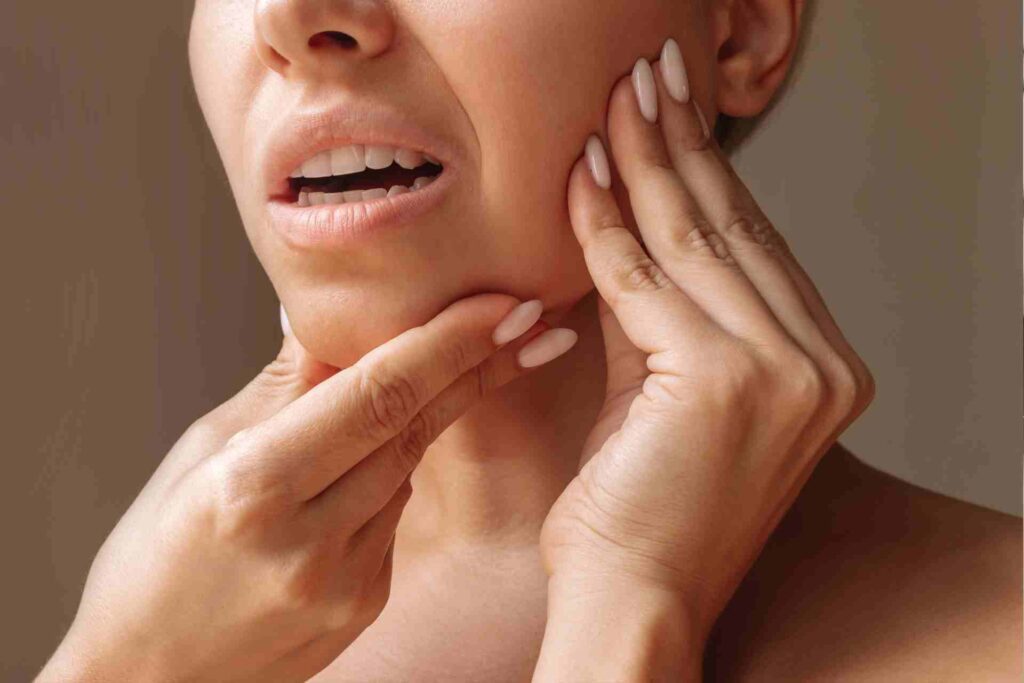Highlights:
- Wisdom teeth can sometimes trigger headaches, especially if they’re impacted, infected, or not aligned properly.
- You might notice symptoms like jaw pain, swelling, or headaches that seem to radiate from the affected area.
- The pain can even feel like a tension headache or sinus pressure, making it hard to pinpoint the source.
- Treatments can range from managing pain and infections to removing the wisdom teeth for long-term relief.
Struggling with stubborn headaches that just won’t go away? Your wisdom teeth might be to blame. When these teeth are impacted, misaligned, or infected, they can trigger pain that radiates to nearby nerves and jaw muscles. This pressure often leads to tension headaches or even migraines.
Taking action early can help you avoid long-term discomfort. An early diagnosis is key to identifying if your wisdom teeth are part of the problem. Visiting your dentist regularly can help you stay ahead of potential issues.
- If your wisdom teeth are impacted, removal may be necessary to alleviate pressure.
- Over-the-counter pain relief can help temporarily, but it’s not a lasting solution.
- A professional consultation will determine the best course of action for your specific case.
In this article, we’ll explore how wisdom teeth cause these issues and how proper treatment can offer lasting relief. Let’s dive in and get you back to feeling better!
How Wisdom Teeth Can Cause Headaches

Did you know your wisdom teeth might be causing those nagging headaches? It’s not always obvious, but when these third molars grow incorrectly, they can create problems beyond your mouth.
How does this happen?
- Wisdom teeth can put pressure on your jaw, leading to inflammation.
- The discomfort doesn’t stay local—it often spreads to your head and face, causing tension or even full-blown headaches.
Why do headaches happen?
The nerves in your jaw are closely connected to those in your head and face. This means if your wisdom teeth are impacted or pushing against other teeth, the irritation can trigger pain in various areas:
- Around your temples
- Behind your eyes
- Near your ears
Common Causes of Headaches Linked to Wisdom Teeth
Impacted Wisdom Teeth
When your wisdom teeth don’t have enough room to come in, they can get stuck, or impacted, which puts a lot of pressure on the surrounding area. This pressure can lead to headaches that radiate through your head and throw off your whole day.
Signs of Impaction
- Swelling around the gums or jaw
- Jaw stiffness or difficulty opening your mouth
- Tenderness and soreness near the back of the mouth
Infection
An infection around a wisdom tooth, called pericoronitis, is a common cause of headaches. When bacteria build up around a tooth that hasn’t fully come through, it can lead to inflammation in the area. This inflammation often spreads, causing a lot of pain and discomfort.
Symptoms of Infection to Watch For
- Persistent bad breath or a bad taste in your mouth
- Redness, swelling, or tenderness near the wisdom tooth
- Fever, indicating a spreading infection
If these symptoms occur, it’s essential to seek immediate dental care to prevent the infection from worsening and to alleviate the associated headaches.
Misalignment and Jaw Tension

When a wisdom tooth is misaligned, it can make your bite feel off, putting extra strain on your jaw muscles. This tension can lead to those annoying, recurring headaches.
It might even cause TMJ issues, which can bring pain that spreads from your jaw to your temples, cheeks, and sometimes even your neck.
Sinus Pressure
When it comes to upper wisdom teeth, there’s something else to think about—sinus pressure.
The roots of these teeth are pretty close to your sinus cavities, so if a wisdom tooth presses on them, it can lead to sinus congestion and even sinus headaches.
Symptoms Indicating Your Wisdom Teeth May Be Causing Headaches
Headache Characteristics
When wisdom teeth trigger headaches, the pain can have distinct characteristics.
- Throbbing pain near the temples or the back of the head.
- Radiating pain starting from the jaw or neck and extending up to the head.
If you’re trying to figure out if your headache is caused by a wisdom tooth, pay attention to whether the pain gets worse when you chew, yawn, or clench your jaw. You might also notice some discomfort in your mouth, which can be a big clue that your wisdom tooth is the culprit.
Additional Warning Signs

Wisdom teeth issues often come with other symptoms to help identify the underlying problem. Be mindful of these warning signs:
- Jaw pain or swelling, which may feel tender to the touch.
- Difficulty opening your mouth fully, possibly due to inflammation.
- Tenderness or bleeding around the gums, usually near the affected teeth.
If you notice any of these signs, it’s important to visit your dentist. Early intervention can prevent further discomfort and protect your oral health, helping you feel your best!
Diagnosis and Treatment of Wisdom Teeth-Related Headaches
Diagnosing the Cause of Headaches

If you’re dealing with frequent headaches and think your wisdom teeth might be to blame, it’s a good idea to check in with a dentist or oral surgeon.
They can figure out what’s going on and help you find some relief. Using their expertise and the right tools, they’ll get to the bottom of what’s causing your discomfort.
- Physical Exam: Your dentist will check for swelling, tenderness, or signs of infection near your wisdom teeth.
- X-Rays: Imaging is essential for detecting impacted teeth, which can press against nerves or cause other complications.
- Symptom Evaluation: Your dentist may ask about associated symptoms, such as jaw pain, ear discomfort, or difficulty chewing, to better understand your condition.
Treatment Options
Once the cause of your headaches is diagnosed, treatment can begin. Thankfully, there are several effective ways to address wisdom teeth-related headaches.

Home remedies can provide quick relief and are easy to try. Some options include:
- Applying a cold compress to the jaw to reduce swelling.
- Using a warm saltwater rinse to ease discomfort and minimize inflammation.
For immediate relief, over-the-counter medications like ibuprofen can help by reducing inflammation and relieving pressure. These options are simple but can make a big difference while you wait for further treatment.
If recurring headaches are caused by an impacted wisdom tooth pressing on nerves or tissues, wisdom tooth removal may be the solution. Your dentist will assess the situation and recommend this outpatient procedure if necessary. Here’s what to expect:
- Procedure: The dentist or oral surgeon will numb the area and carefully extract the problem tooth. The process is usually quick but tailored to your needs.
- Recovery tips: Focus on soft foods, rest, and gentle oral hygiene to speed up healing. Avoid straws and smoking to prevent complications like dry socket.
If headaches persist despite wisdom tooth removal, other factors like jaw misalignment or tension in the temporomandibular joint (TMJ) may be at play. In these cases, your dentist may suggest:
- Orthodontic treatments to realign the jaw.
- TMJ therapy to relieve tension and restore optimal jaw function.
Whatever the underlying cause, your dentist will guide you toward the best treatment plan to help eliminate headaches and improve overall comfort.
When to See a Dentist

Here are some warning signs you should never ignore:
- Persistent or severe headaches with no relief: If your headaches are frequent and not resolving with rest or over-the-counter treatments, it could point to jaw misalignment, TMJ issues, or other dental concerns.
- Swelling or signs of infection: Any swelling in your jaw, face, or gums could indicate an infection that needs prompt attention. Left untreated, infections can spread and lead to serious complications.
- Fever or difficulty swallowing: These symptoms could suggest an oral infection or abscess that requires immediate dental or medical care.
If you experience any of these issues, don’t wait to see your dentist. Early intervention can protect not just your oral health but your overall well-being.
FAQ
Can Wisdom Teeth Cause Migraines or Just Regular Headaches?
Wisdom teeth can cause headaches or even migraines. Tension headaches result from jaw stress due to impacted teeth, while migraines may occur if nearby nerves are irritated. If you suspect your wisdom teeth are the cause, consult a dentist for diagnosis and treatment.
What Are the First Signs That Wisdom Teeth Might Be Causing Headaches?
Wisdom tooth headaches often start with jaw pain, gum swelling, or an ache radiating to the temples. You may also notice difficulty chewing or jaw stiffness. If these symptoms persist with headaches, get your wisdom teeth checked.
Should I Have My Wisdom Teeth Removed If They’re Causing Headaches?
If wisdom teeth are causing headaches, removal may be needed. Dentists often try pain management or anti-inflammatory treatments first. Extraction is recommended for impacted teeth causing pain, misalignment, or pressure.
Can Upper Wisdom Teeth Cause Sinus Headaches?
Yes, upper wisdom teeth can sometimes affect the sinus cavities, especially if they grow too close to them or cause pressure as they develop. This proximity can lead to sinus headaches characterized by pressure around the cheeks, nose, or forehead. If you’re experiencing sinus-like symptoms along with dental discomfort, the upper wisdom teeth might be playing a role.
How Long Does It Take for Headaches to Go Away After Wisdom Tooth Removal?
After wisdom tooth removal, headaches related to the teeth usually subside within a few days to a couple of weeks. Recovery times vary from person to person, but most individuals notice improvement in headache symptoms as the swelling decreases and the area begins to heal. If headaches persist beyond a few weeks, consult your dentist for follow-up care.
Conclusion
Wisdom teeth and headaches are often connected, especially when impacted or misaligned wisdom teeth create pressure, inflammation, or tension in nearby muscles and nerves. Ignoring these signs can lead to more serious issues over time, so it’s important to act quickly.
Common symptoms to watch out for include:
- Headaches or migraines
- Jaw pain or stiffness
- Swelling or tenderness around the jaw
Early treatment not only prevents further complications but also improves your overall well-being.
For more practical advice, follow Joyce the Dentist on social media. Let’s keep your smile strong and healthy together!





















